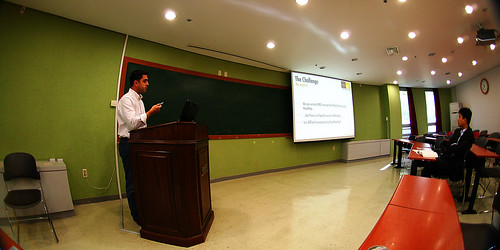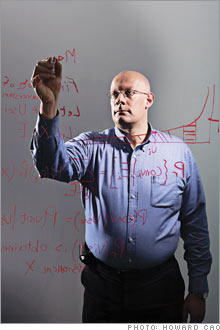September 8-10, 2009
Palacio Miramar, Donostia - San Sebastián
http://ixa2.si.ehu.es/sepln2009/
INTRODUCTION
The 25th edition of the Annual Conference of the Spanish Society for Natural Language Processing (SEPLN) will take place in the Miramar Palace in San Sebastian on September 8, 9 and 10, 2008.
We also expect to organise three satellite workshops during the week of the conference (see list of workshops).
The huge amount of information available in digital format and in different languages demands systems that enable us to access this vast library in an increasingly more structured way.
In this same area, there is a renewed interest in improving information accessibility and information exploitation in multilingual environments. Many of the formal foundations for dealing appropriately with these necessities have been, and are still being established in the area of Natural Language Processing and its many branches:
The aim of the conference is to provide a forum for discussion and communication where the latest research work and developments in the field of Natural Language Processing (NLP) can be presented by scientific and business communities. The conference also aims at exposing new possibilities of real applications and R&D projects in this field.
Moreover, as in previous editions, there is the intention of identifying future guidelines or paths for basic research and foreseen software applications, in order to compare them against the market needs. Finally, the conference intends to be an appropriate forum in helping new professionals to become active members in this field.
TOPICS
Researchers and companies are encouraged to send communications, project abstracts or demonstrations related to any of the following language technology topics:
STRUCTURE OF THE CONFERENCE
The conference will last three days, and will consist of sessions devoted to presenting papers, posters, ongoing research projects, prototype product demonstrations or products connected with topics addressed in the conference. Besides, we expect to organize three satellite workshops during the week of the conference.
SUBMISSIONS
The proposal must be submitted earlier than April 24, 2009 and they must meet certain format and style requirements.
Both the delivery and revision of proposals will be done exclusively in PDF electronic format via the Myreview system. We recommend using the LaTeX and Word templates that can be downloaded from the conference webpage.
Besides, the proposals will have to comply the following requirements, depending if they are communications, demos or projects.
COMMUNICATIONS
Authors are encouraged to send theoretical or system-related proposals.
The proposals must include the following sections:
The papers proposed will be assessed at least by three reviewers, and can be accepted to be presented either as posters or as communications, depending on the program necessities. However, no distinction will be made between communications and posters in the printed version of the SEPLN magazine.
PROJECTS AND DEMOS
As in previous editions, the organizers encourage participants to give oral presentations of R&D projects and demos of systems or tools related to the NLP field. For oral presentations on R&D projects to be accepted, the following information must be included:
For demonstrations to be accepted, the following information is mandatory:
IMPORTANT DATES
SCIENTIFIC COMMITTEE
Chairman: Kepa Sarasola (Euskal Herriko Unibertsitatea)
Members:
* Itziar Aduriz (Universitat de Barcelona)
* José Gabriel Amores (Universidad de Sevilla)
* Jose Maria Arriola (Euskal Herriko Unibertsitatea)
* Xabier Artola (Euskal Herriko Unibertsitatea)
* Toni Badía (Universitat Pompeu Fabra)
* Manuel de Buenaga (Universidad Europea de Madrid)
* Irene Castellón (Universitat de Barcelona)
* Arantza Díaz de Ilarraza (Euskal Herriko Unibertsitatea)
* Víctor Díaz Madrigal (Universidad de Sevilla)
* Antonio Ferrández (Universitat d'Alacant)
* Mikel Forcada (Universitat d'Alacant)
* Ana García-Serrano (Universidad Politécnica de Madrid)
* Alexander Gelbukh (Instituto Politécnico Nacional. México)
* Koldo Gojenola (Euskal Herriko Unibertsitatea)
* Xavier Gómez Guinovart (Universidade de Vigo)
* Julio Gonzalo (UNED)
* José Miguel Goñi (Universidad Politécnica de Madrid)
* José Carlos González (Universidad Politécnica de Madrid)
* Montserrat Marichalar (Euskal Herriko Unibertsitatea)
* José Mariño (Universitat Politècnica de Catalunya)
* M. Antonia Martí (Universitat de Barcelona)
* María Teresa Martín (Universidad de Jaén)
* Patricio Martínez (Universitat d'Alacant)
* Paloma Martínez (Universidad Carlos III, Madrid)
* Raquel Martínez (UNED)
* Ruslan Mitkov (Universidad de Wolverhampton)
* Manuel Montes y Gómez (Instituto Nacional de Astrofísica, Óptica y
Electrónica. México)
* Lidia Moreno (Universitat Politècnica de València)
* Lluís Padró (Universitat Politècnica de Catalunya)
* Ramón López Cózar (Universidad de Granada)
* Manuel Palomar (Universitat d'Alacant)
* Ferrán Pla (Universitat Politècnica de València)
* German Rigau (Euskal Herriko Unibertsitatea)
* Horacio Rodríguez (Universitat Politècnica de Catalunya)
* Leonel Ruiz Miyares (Centro de Lingüística Aplicada de Santiago de
Cuba)
* Emilio Sanchís (Universitat Politècnica de València)
* Kepa Sarasola (Euskal Herriko Unibertsitatea)
* Mariona Taulé (Universitat de Barcelona)
* L. Alfonso Ureña (Universidad de Jaén)
* Felisa Verdejo (UNED)
* Manuel Vilares (Universidad de A Coruña)
* Luis Villaseñor-Pineda (Instituto Nacional de Astrofísica, Óptica y
Electrónica. México)
CONTACT INFORMATION
All the information about the Conference is available in the 25th SEPLN Conference website: http://ixa2.si.ehu.es/sepln2009/ E-mail: sepln2009@ehu.es
Palacio Miramar, Donostia - San Sebastián
http://ixa2.si.ehu.es/sepln2009/
INTRODUCTION
The 25th edition of the Annual Conference of the Spanish Society for Natural Language Processing (SEPLN) will take place in the Miramar Palace in San Sebastian on September 8, 9 and 10, 2008.
We also expect to organise three satellite workshops during the week of the conference (see list of workshops).
The huge amount of information available in digital format and in different languages demands systems that enable us to access this vast library in an increasingly more structured way.
In this same area, there is a renewed interest in improving information accessibility and information exploitation in multilingual environments. Many of the formal foundations for dealing appropriately with these necessities have been, and are still being established in the area of Natural Language Processing and its many branches:
- Information extraction and retrieval, Questions answering systems,
- Machine Translation, Automatic analysis of textual content, Text
- Generation, and Speech recognition and synthesis.
The aim of the conference is to provide a forum for discussion and communication where the latest research work and developments in the field of Natural Language Processing (NLP) can be presented by scientific and business communities. The conference also aims at exposing new possibilities of real applications and R&D projects in this field.
Moreover, as in previous editions, there is the intention of identifying future guidelines or paths for basic research and foreseen software applications, in order to compare them against the market needs. Finally, the conference intends to be an appropriate forum in helping new professionals to become active members in this field.
TOPICS
Researchers and companies are encouraged to send communications, project abstracts or demonstrations related to any of the following language technology topics:
- Linguistic, mathematic and psycholinguistic models of language
- Corpus linguistics
- Development of linguistic resources and tools
- Grammars and formalisms for morphological and syntactic analysis
- Semantics, pragmatics and discourse
- Lexical ambiguity resolution
- Machine Learning in NLP
- Monolingual and multilingual text generation
- Machine translation
- Speech synthesis and recognition
- Monolingual and multilingual information extraction and retrieval
- Question answering systems
- Automatic textual content analysis
- Text summarization
- NLP-based generation of teaching resources
- NLP for languages with limited resources
- NLP industrial applications
STRUCTURE OF THE CONFERENCE
The conference will last three days, and will consist of sessions devoted to presenting papers, posters, ongoing research projects, prototype product demonstrations or products connected with topics addressed in the conference. Besides, we expect to organize three satellite workshops during the week of the conference.
SUBMISSIONS
The proposal must be submitted earlier than April 24, 2009 and they must meet certain format and style requirements.
Both the delivery and revision of proposals will be done exclusively in PDF electronic format via the Myreview system. We recommend using the LaTeX and Word templates that can be downloaded from the conference webpage.
Besides, the proposals will have to comply the following requirements, depending if they are communications, demos or projects.
COMMUNICATIONS
Authors are encouraged to send theoretical or system-related proposals.
The proposals must include the following sections:
- A title of the communication.
- The complete names of the authors, their affiliations, address, and e-mail (anonymous in the submitted proposal).
- An abstract in English and Spanish (maximum 150 words), including a list of keywords or related topics.
- The proposal can be written and presented in Spanish or English, and its overall maximum length will be 8 pages, excluding references, which can take up an additional whole page at the most.
- The documents must not include headings or footnotes.
The papers proposed will be assessed at least by three reviewers, and can be accepted to be presented either as posters or as communications, depending on the program necessities. However, no distinction will be made between communications and posters in the printed version of the SEPLN magazine.
PROJECTS AND DEMOS
As in previous editions, the organizers encourage participants to give oral presentations of R&D projects and demos of systems or tools related to the NLP field. For oral presentations on R&D projects to be accepted, the following information must be included:
- Project title
- Name, affiliation, address, e¬mail and phone number of the project director
- Funding institutions
- Groups participating in the project
- Abstract (2 pages maximum)
For demonstrations to be accepted, the following information is mandatory:
- Demo title
- Name, affiliation, e-mail and phone number of the authors
- Abstract (2 pages maximum)
- Time estimation for the whole presentation
IMPORTANT DATES
- April 24, 2009: Deadline for submitting papers, projects and demos
- May 25, 2009: Notification of acceptance
- June 19, 2009: Deadline for submitting the final version
- July 15, 2009: Deadline for early registration
- Sept. 7, 2009: Workshops
- Sept. 8, 9 & 10: 25th SEPLN Conference
SCIENTIFIC COMMITTEE
Chairman: Kepa Sarasola (Euskal Herriko Unibertsitatea)
Members:
* Itziar Aduriz (Universitat de Barcelona)
* José Gabriel Amores (Universidad de Sevilla)
* Jose Maria Arriola (Euskal Herriko Unibertsitatea)
* Xabier Artola (Euskal Herriko Unibertsitatea)
* Toni Badía (Universitat Pompeu Fabra)
* Manuel de Buenaga (Universidad Europea de Madrid)
* Irene Castellón (Universitat de Barcelona)
* Arantza Díaz de Ilarraza (Euskal Herriko Unibertsitatea)
* Víctor Díaz Madrigal (Universidad de Sevilla)
* Antonio Ferrández (Universitat d'Alacant)
* Mikel Forcada (Universitat d'Alacant)
* Ana García-Serrano (Universidad Politécnica de Madrid)
* Alexander Gelbukh (Instituto Politécnico Nacional. México)
* Koldo Gojenola (Euskal Herriko Unibertsitatea)
* Xavier Gómez Guinovart (Universidade de Vigo)
* Julio Gonzalo (UNED)
* José Miguel Goñi (Universidad Politécnica de Madrid)
* José Carlos González (Universidad Politécnica de Madrid)
* Montserrat Marichalar (Euskal Herriko Unibertsitatea)
* José Mariño (Universitat Politècnica de Catalunya)
* M. Antonia Martí (Universitat de Barcelona)
* María Teresa Martín (Universidad de Jaén)
* Patricio Martínez (Universitat d'Alacant)
* Paloma Martínez (Universidad Carlos III, Madrid)
* Raquel Martínez (UNED)
* Ruslan Mitkov (Universidad de Wolverhampton)
* Manuel Montes y Gómez (Instituto Nacional de Astrofísica, Óptica y
Electrónica. México)
* Lidia Moreno (Universitat Politècnica de València)
* Lluís Padró (Universitat Politècnica de Catalunya)
* Ramón López Cózar (Universidad de Granada)
* Manuel Palomar (Universitat d'Alacant)
* Ferrán Pla (Universitat Politècnica de València)
* German Rigau (Euskal Herriko Unibertsitatea)
* Horacio Rodríguez (Universitat Politècnica de Catalunya)
* Leonel Ruiz Miyares (Centro de Lingüística Aplicada de Santiago de
Cuba)
* Emilio Sanchís (Universitat Politècnica de València)
* Kepa Sarasola (Euskal Herriko Unibertsitatea)
* Mariona Taulé (Universitat de Barcelona)
* L. Alfonso Ureña (Universidad de Jaén)
* Felisa Verdejo (UNED)
* Manuel Vilares (Universidad de A Coruña)
* Luis Villaseñor-Pineda (Instituto Nacional de Astrofísica, Óptica y
Electrónica. México)
CONTACT INFORMATION
All the information about the Conference is available in the 25th SEPLN Conference website: http://ixa2.si.ehu.es/sepln2009/ E-mail: sepln2009@ehu.es












